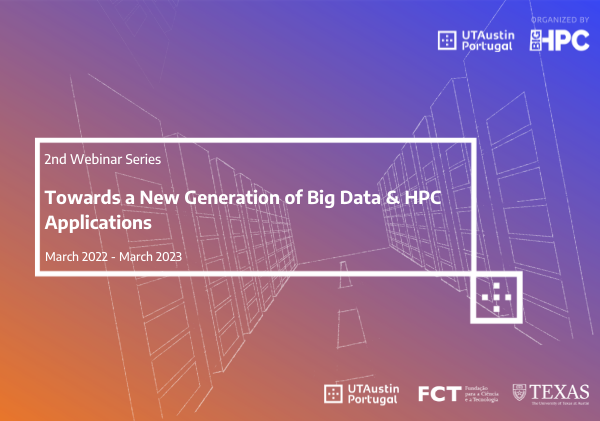After the success of the first webinar series, the UT Austin Portugal Program and the BigHPC consortium are back with a second round of webinars, running every two months from March 2022 to March 2023. This time around, experts from academia and industry will meet to look into the main challenges and opportunities that Big Data applications pose to HPC centers.
What’s new in this edition?
While being a continuation of the previous series, this new round of webinars breaks away from the perspective used in On the Road to HPC: Major Challenges and New Opportunities edition – 1st Webinar Series by focusing on concrete applications of HPC and Big Data.
Whereas the first series brought in discussants to present the main scientific and technological challenges resulting from the need to efficiently support Big Data applications across HPC infrastructures (from storage to monitoring to virtualization and visualization), Towards a new generation of Big Data & HPC applications – 2nd Webinar Series will talk you through some of the most relevant scientific and technological advancements made in response to the challenges we have dissected before.
Am I required to attend all the webinars?
To attend this edition you are not required to have registered for the previous ones. Topics will be organized and explored in a way that makes each edition independent of the other. You may always watch the previous webinars on our YouTube Channel to get the most out of this new series, though.
How are the webinars organized?
Sessions will be kept short and to the point: a 30/40-minute keynote presentation by an academic or industrial expert involved in the BigHPC project, followed by a 10-minute moderated discussion with participants. You may choose to attend all 5 webinars or register only for those which best meet your learning goals.
Is there any cost to attend the webinars?
No, all webinars are free of charge!
Can we count on you?
Check out the full agenda below.
Full Agenda
| Date | Title | Speaker | |
| March 10 2022 | Webinar 1: Linking GitOPS towards fast innovation over BigHPC | Samuel Bernardo (LIP) | Recordings Here |
| May 5 2022 | Webinar 2: User-level Software-Defined Storage Data Planes | Ricardo Macedo (INESC TEC) | Recordings Here |
| July 14 2022 | Webinar 3: Building High-Performance Storage Systems for Persistent Memory | Rohan Kadekodi (UT Austin) | Recordings Here |
| September 22 2022 | Webinar 4: Experiments in implementing the BigHPC Virtual Manager | Amit Ruhela, John Cazes, and Stephen Harrell (TACC & UT Austin) | Recordings Here |
| November 17 2022 | Webinar 5: Monitoring in BigHPC: Lessons Learned | Júlio Costa (Wavecom) | Recordings Here |
| January 26 2023 | Webinar 6: A deep dive on BigHPC platform delivery into HPC clusters | Samuel Bernardo and Miguel Viana (LIP) | Recordings Here |
| May 18 2023 | Webinar 7: Three years contributing to improving Big Data Applications “support” in HPC | Bruno Antunes (Wavecom) | João Paulo (INESC TEC) | Todd Evans (TACC) | Recordings Here |
Important information about our training activities:
– Participation is free of charge. Kindly note, however, that to put on a course, we mobilize several people and incur expenses. Therefore, if you register for an event of ours, we expect you to attend it, for every time we assign a seat to someone we are preventing someone else from participating.
– Participants will be sent a link to the session 2 hours before the start time. If you do not receive it, please contact us at events@utaustinportugal.org
– Since our online courses are available globally, use this time zone converter to know what time the session is starting in your location: https://www.timeanddate.com/worldclock/converter.html
The BigHPC Project is co-financed by the European Regional Development Fund through the Operational Program for Competitiveness and Internationalisation – COMPETE 2020, the Lisbon Portugal Regional Operational Program – Lisboa 2020 and the Portuguese Foundation for Science and Technology – FCT under UT Austin Portugal.

